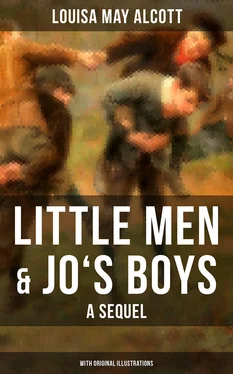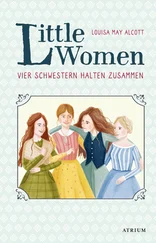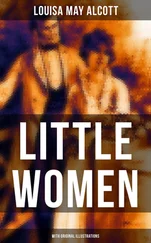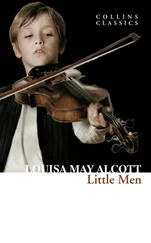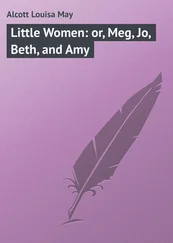"We find 'em or buy 'em, or folks give 'em to us. My father sends me mine; but as soon as I get egg money enough, I'm going to buy a pair of ducks. There's a nice little pond for 'em behind the barn, and people pay well for duck-eggs, and the little duckies are pretty, and it's fun to see 'em swim," said Tommy, with the air of a millionaire.
Nat sighed, for he had neither father nor money, nothing in the wide world but an old empty pocketbook, and the skill that lay in his ten finger tips. Tommy seemed to understand the question and the sigh which followed his answer, for after a moment of deep thought, he suddenly broke out,
"Look here, I'll tell you what I'll do. If you will hunt eggs for me, I hate it, I'll give you one egg out of every dozen. You keep account, and when you've had twelve, Mother Bhaer will give you twenty-five cents for 'em, and then you can buy what you like, don't you see?"
"I'll do it! What a kind feller you are, Tommy!" cried Nat, quite dazzled by this brilliant offer.
"Pooh! that is not anything. You begin now and rummage the barn, and I'll wait here for you. Granny is cackling, so you're sure to find one somewhere," and Tommy threw himself down on the hay with a luxurious sense of having made a good bargain, and done a friendly thing.
Nat joyfully began his search, and went rustling from loft to loft till he found two fine eggs, one hidden under a beam, and the other in an old peck measure, which Mrs. Cockletop had appropriated.
"You may have one and I'll have the other, that will just make up my last dozen, and to-morrow we'll start fresh.
Here, you chalk your accounts up near mine, and then we'll be all straight," said Tommy, showing a row of mysterious figures on the side of an old winnowing machine.
With a delightful sense of importance, the proud possessor of one egg opened his account with his friend, who laughingly wrote above the figures these imposing words,
"T. Bangs & Co."
Poor Nat found them so fascinating that he was with difficulty persuaded to go and deposit his first piece of portable property in Asia's store-room. Then they went on again, and having made the acquaintance of the two horses, six cows, three pigs, and one Alderney "Bossy," as calves are called in New England, Tommy took Nat to a certain old willow-tree that overhung a noisy little brook. From the fence it was an easy scramble into a wide niche between the three big branches, which had been cut off to send out from year to year a crowd of slender twigs, till a green canopy rustled overhead. Here little seats had been fixed, and a hollow place a closet made big enough to hold a book or two, a dismantled boat, and several half-finished whistles.
"This is Demi's and my private place; we made it, and nobody can come up unless we let 'em, except Daisy, we don't mind her," said Tommy, as Nat looked with delight from the babbling brown water below to the green arch above, where bees were making a musical murmur as they feasted on the long yellow blossoms that filled the air with sweetness.
"Oh, it's just beautiful!" cried Nat. "I do hope you'll let me up sometimes. I never saw such a nice place in all my life. I'd like to be a bird, and live here always."
"It is pretty nice. You can come if Demi don't mind, and I guess he won't, because he said last night that he liked you."
"Did he?" and Nat smiled with pleasure, for Demi's regard seemed to be valued by all the boys, partly because he was Father Bhaer's nephew, and partly because he was such a sober, conscientious little fellow.
"Yes; Demi likes quiet chaps, and I guess he and you will get on if you care about reading as he does."
Poor Nat's flush of pleasure deepened to a painful scarlet at those last words, and he stammered out,
I can't read very well; I never had any time; I was always fiddling round, you know."
"I don't love it myself, but I can do it well enough when I want to," said Tommy, after a surprised look, which said as plainly as words, "A boy twelve years old and can't read!"
"I can read music, anyway," added Nat, rather ruffled at having to confess his ignorance.
"I can't;" and Tommy spoke in a respectful tone, which emboldened Nat to say firmly,
"I mean to study real hard and learn every thing I can, for I never had a chance before. Does Mr. Bhaer give hard lessons?"
"No; he isn't a bit cross; he sort of explains and gives you a boost over the hard places. Some folks don't; my other master didn't. If we missed a word, didn't we get raps on the head!" and Tommy rubbed his own pate as if it tingled yet with the liberal supply of raps, the memory of which was the only thing he brought away after a year with his "other master."
"I think I could read this," said Nat, who had been examining the books.
"Read a bit, then; I'll help you," resumed Tommy, with a patronizing air.
So Nat did his best, and floundered through a page with may friendly "boosts" from Tommy, who told him he would soon "go it" as well as anybody. Then they sat and talked boy-fashion about all sorts of things, among others, gardening; for Nat, looking down from his perch, asked what was planted in the many little patches lying below them on the other side of the brook.
"These are our farms," said Tommy. "We each have our own patch, and raise what we like in it, only have to choose different things, and can't change till the crop is in, and we must keep it in order all summer."
"What are you going to raise this year?"
"Wal, I cattleated to hev beans, as they are about the easiest crop a-goin'."
Nat could not help laughing, for Tommy had pushed back his hat, put his hands in his pockets, and drawled out his words in unconscious imitation of Silas, the man who managed the place for Mr. Bhaer.
"Come, you needn't laugh; beans are ever so much easier than corn or potatoes. I tried melons last year, but the bugs were a bother, and the old things wouldn't get ripe before the frost, so I didn't have but one good water and two little 'mush mellions,' " said Tommy, relapsing into a "Silasism" with the last word.
"Corn looks pretty growing," said Nat, politely, to atone for his laugh.
"Yes, but you have to hoe it over and over again. Now, six weeks' beans only have to be done once or so, and they get ripe soon. I'm going to try 'em, for I spoke first. Stuffy wanted 'em, but he's got to take peas; they only have to be picked, and he ought to do it, he eats such a lot."
"I wonder if I shall have a garden?" said Nat, thinking that even corn-hoeing must be pleasant work.
"Of course you will," said a voice from below, and there was Mr. Bhaer returned from his walk, and come to find them, for he managed to have a little talk with every one of the lads some time during the day, and found that these chats gave them a good start for the coming week.
Sympathy is a sweet thing, and it worked wonders here, for each boy knew that Father Bhaer was interested in him, and some were readier to open their hearts to him than to a woman, especially the older ones, who liked to talk over their hopes and plans, man to man. When sick or in trouble they instinctively turned to Mrs. Jo, while the little ones made her their mother-confessor on all occasions.
In descending from their nest, Tommy fell into the brook; being used to it, he calmly picked himself out and retired to the house to be dried. This left Nat to Mr. Bhaer, which was just what he wished, and, during the stroll they took among the garden plots, he won the lad's heart by giving him a little "farm," and discussing crops with him as gravely as if the food for the family depended on the harvest. From this pleasant topic they went to others, and Nat had many new and helpful thoughts put into a mind that received them as gratefully as the thirsty earth had received the warm spring rain. All supper time he brooded over them, often fixing his eyes on Mr. Bhaer with an inquiring look, that seemed to say, "I like that, do it again, sir." I don't know whether the man understood the child's mute language or not, but when the boys were all gathered together in Mrs. Bhaer's parlor for the Sunday evening talk, he chose a subject which might have been suggested by the walk in the garden.
Читать дальше
